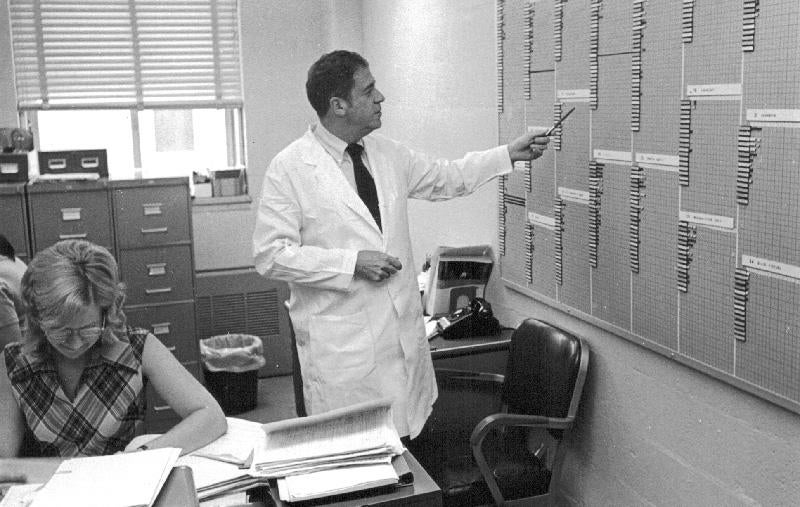
Subscribe to Pittwire Today
Get the most interesting and important stories from the University of Pittsburgh.Bernard Fisher, University of Pittsburgh distinguished service professor of surgery, is celebrating his 100th birthday today. A role model for the surgeon-scientist, Fisher advanced the understanding of the clinical biology of breast cancer and pioneered the design and implementation of large-scale multi-institutional randomized clinical trials. His work set the standard for hundreds of subsequent trials that have improved the rate of survival and quality of life for countless women with breast cancer as well as patients with other forms of cancer.
Fisher has received numerous awards and recognitions throughout his career, including the Albert Lasker Clinical Medical Research Award, the American Association for Cancer Research Award for Lifetime Achievement and an honorary doctorate from Pitt. A member of the National Academy of Medicine, he was appointed to the President’s Cancer Panel and the National Cancer Advisory Board and was the first surgeon to serve as president of the American Society of Clinical Oncology.
“The contributions that he made in breast cancer go far beyond breast cancer because he basically illuminated the biology of metastatic cancer in general,” said Arthur S. Levine, senior vice chancellor for the health sciences and the John and Gertrude Petersen Dean of Medicine at the University of Pittsburgh School of Medicine. “He has made some of the most important contributions to the practice of medicine in our lifetimes.”
Fisher earned a Bachelor of Science in 1940 and an MD in 1943, both at Pitt. Following his training as a surgeon, he joined the faculty of Pitt as its first full-time faculty member in the Department of Surgery and contributed to the development of both transplantation and vascular surgery early in his career. In 1953, he established the first Laboratory of Surgical Research at the University based on his firm belief that evidence gathered through scientific inquiry should serve as the basis for advancing patient care.
He became a founding member of the National Surgical Adjuvant Breast and Bowel Project (NSABP) in 1958 and served as its chairman from 1967-1994. Based on research conducted in his laboratory at Pitt, he formulated hypotheses that were tested in clinical trials conducted with the NSABP in the 1960s and ’70s. The findings from these trials led him to challenge the prevailing breast cancer dogma followed since the 19th century, which stated that patients were best cured through radical mastectomy — the disfiguring removal of all breast and nearby tissues.
In 1971, Fisher led the NSABP in a landmark clinical trial in women with primary breast cancer comparing radical mastectomy with less extensive total mastectomy. In 1976, he initiated a study comparing total mastectomy with less disfiguring lumpectomy, with or without breast irradiation. Neither study showed a survival advantage from the more extensive procedure. Those studies provided a scientific basis for less extensive surgery.
Findings from other Fisher-led studies showed that the addition of systemic, adjuvant chemotherapy or hormonal therapy provided a survival advantage over surgery alone. Based on these studies, Fisher and the NSABP initiated the first trial to test tamoxifen as a breast cancer prevention agent in 1992. That trial showed that tamoxifen decreased the incidence of breast cancer and was appropriate for many women at increased risk for the disease. As a result of Fisher’s pioneering research, women worldwide with breast cancer have a scientific basis to guide treatment, which can lead to improved quality of life and a greater chance of long-term survival.
“The NSABP, to this day, is one of the major cooperative clinical trials groups. That was a conceptual advance — that moving clinical trials forward couldn’t rely on just a single center or two,” said Robert Ferris, director of the UPMC Hillman Cancer Center and Pitt associate vice chancellor for cancer research. “The cooperative clinical trials — where people get together and use funding from the National Institutes of Health, the National Cancer Institute, but go beyond our parochial institutional protections and actually work together across the country — can answer bigger, transformational, practice-changing questions like [Fisher] did.”
Perhaps Fisher’s most important contribution has been the establishment of a scientific approach to the study of breast cancer. His work resulted in the creation of the paradigm that not only governs the treatment for breast cancer but has shaped the landscape of cancer research.
“No clinical therapy should be determined by emotion or conviction — the determinant must be the scientific method,” Fisher said in a 2009 video interview shown at that year’s annual Pitt lecture named in his honor.

Notable research milestones
1953: Founds and directs Pitt’s Laboratory of Surgical Research as the first full-time faculty member in the Department of Surgery.
1958: Becomes a founding member of the NSABP. The group starts its first clinical trial, called B-01, to test the ability of the drug thiotepa to reduce early recurrence rates in breast cancer patients. The trial was a proof of principle that encouraged the group to continue this type of research.
1963: A four-year lab study by Fisher and his brother Edwin Fisher, a Pitt pathologist and 1947 graduate with expertise in cancer, demonstrates that cancer cells can lie dormant for years before developing into detectable metastatic disease.
1964: Fisher performs the first kidney transplant in Pittsburgh. It is one of his many contributions to the field of transplantation, which will also include the establishment of Pittsburgh’s organ-sharing network and research into skin transplantation.
1977: The first official publication from clinical trial B-04 reports that radical mastectomy provided no survival advantage for breast cancer patients when compared with simple mastectomy. With this evidence, the public begins to question the necessity of traditional radical cancer surgery.
1985: Initial results from the B-06 trial are published, reporting that breast cancer patients with tumors of 4 centimeters or smaller do as well with lumpectomy and radiation as they do with total mastectomy. The results support Fisher’s hypothesis of cancer as a systemic disease that can be treated with less extensive surgery.
1998: Fisher and the NSABP publish the results of the Breast Cancer Prevention Trial. It shows the anti-estrogen drug tamoxifen can reduce the occurrence of breast cancer by almost half in women at increased risk for the disease.


